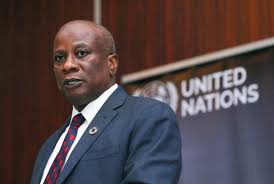Kallon lamented the dire living conditions of the people in the camps, adding that the impact of the recent fighting has created a humanitarian tragedy.
“Clashes on December 26, 2018, between Nigerian government forces and non-state armed groups in Baga town, on the shores of Lake Chad, about 200 kilometres north of state capital Maiduguri, triggered the massive displacement, with most women, men and children converging on already congested camps for internally displaced people in Maiduguri or Monguno town,” the statement read.
“A subsequent attempted attack on Monguno on December 28, 2018, has exacerbated the situation, generating further displacement.
“It is heart-wrenching to see so many of these people living in congested camps or sleeping outside with no shelter. Civilians continue to bear the brunt of the conflict and the United Nations is extremely concerned about the impact that violence in north-east Nigeria, especially in Borno State, is having on civilians.
“30,000 internally displaced people have arrived in Maiduguri, mainly from Baga, in recent weeks. The majority of these people have arrived since December 20, 2018, often after arduous journeys with young children. These people include an estimated 20,000 internally displaced people who have arrived in Teachers Village camp in Maiduguri, stretching the camp’s capacity beyond the limit.
“Some 260 aid workers have been withdrawn from three local government areas (Monguno, Kala/Balge and Kukawa) affected by the conflict since November, affecting the delivery of humanitarian assistance to hundreds of thousands of people.”
In 2018, the Islamic State West Africa Province (ISWAP), a faction of Boko Haram, executed Hauwa Leman and Saifura Ahmed, who were aid workers in the region.
Source: The cable

 The United Nations says it has withdrawn about 260 aid workers from three local governments in Borno state over the recent resurgence of attacks by Boko Haram terrorists. In a statement on Wednesday, Samantha Newport, UN spokesperson in Nigeria, said the development has affected its humanitarian service delivery in the embattled region.
The United Nations says it has withdrawn about 260 aid workers from three local governments in Borno state over the recent resurgence of attacks by Boko Haram terrorists. In a statement on Wednesday, Samantha Newport, UN spokesperson in Nigeria, said the development has affected its humanitarian service delivery in the embattled region.




